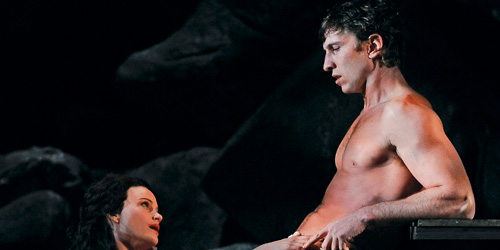Nobody could accuse Robert Falls of taking the safe route with “Desire Under the Elms.” As in Simon McBurney’s “All My Sons” revival earlier this season, the director layers on bold auteurial flourishes in a stylized bid to fire up the molten Greek tragedy in a naturalistic American drama. And as with that production, responses will range from rejection to rapture. Transferring from Chicago’s Goodman Theater, where it was the centerpiece of a Eugene O’Neill festival, the staging is grimly overwrought, with an intensity that never quite translates into emotional impact, yet its unyielding harshness is undeniably compelling.
Ephraim Cabot (Brian Dennehy) is a hard, mean man ruled only by a hard god. His domain in Falls’ and designer Walt Spangler’s expressionistic vision is not the traditional New England farm fringed by elm trees; it’s more like some barren planet whose rocky terrain is being reshaped into a prison wall around Cabot’s land. Ephraim’s sons by his first marriage, Simeon (Daniel Stewart Sherman) and Peter (Boris McGiver), are grunting brutes who serve as their father’s chain gang, hauling boulders all day and stuffing food down their throats like inmates of the toughest cellblock.
More rocks dangle from thick ropes above, some of them visible through a murky scrim as if underwater, while the house also remains suspended on ropes for most of the action. Their home and their land literally hang over these characters’ heads, out of reach and impervious to ownership, offering more menace than stability or sanctuary.
Striking if not exactly subtle, the forceful visuals are indicative of the lengths to which Falls goes to swell O’Neill’s brooding melodrama into deafening operatic tragedy. Michael Philippi’s scorching lights and Richard Woodbury’s music also hammer that agenda. The latter is used both to underscore dialogue and in wordless stretches such as a hulking opening ballet performed by Simeon and Peter by way of Tod Browning. Accompanied by jungle drumming and animal noises, they lug rocks and tear the entrails from a butchered pig while their more gentle half-brother, Eben (Pablo Schreiber), dons an apron and fries bacon.
Eben has inherited not only his mother’s household duties but also a bitter grudge over the transferal of her family’s farm to Ephraim after she was driven by overwork into an early grave. When 76-year-old Ephraim returns from town with gold-digging young third wife Abbie (Carla Gugino), Eben buys out his half-brother’s shares in the farm and starts squaring off with his new “Ma.”
One of Falls’ most unconventional touches is an anachronistic musical montage set to Bob Dylan’s “Not Dark Yet,” in which Abbie cleans and takes possession of the house, pegging out laundry while drinking in Eben’s muscled body as he steps in and out of the bathtub. “It’s not dark yet, but it’s gettin’ there,” sings Dylan, articulating a despair that’s about to get uglier. Equally audacious is the torrid mime sequence in which Abbie’s and Eben’s burning souls are drawn together while blowhard Ephraim boasts of his Herculean achievement in turning a pile of rocks into the coveted farm.
Embellishing a production pruned to an intermissionless one hour 45 minutes, these florid directorial strokes might be inorganic and to some extent take the audience out of the drama, but they’re nothing if not arresting.
The fatal turning point comes when Abbie lures Eben into his mother’s hallowed parlor to consummate their quasi-Oedipal love. Her initial plan is to secure the farm by making Ephraim believe the son born out of that tryst is his. But when Eben denounces her as a cold schemer, the unexpected depth of her love drives Abbie to murder.
The play’s liberal doses of psychosexual mayhem, carnality and horror could easily teeter into melodramatic camp, particularly when channeled through such baroque direction. But Gugino’s and Schreiber’s performances keep it grounded. Both of their impulsive characters require lurching shifts, from wariness and hostility through recklessness and surrender to violent passion, torment and atonement. The actors claw their way through the heightened emotions and idiomatic dialogue without sacrificing dramatic integrity, and the heat between them is palpable. Abbie’s suppressed yearning for love and Eben’s agonizing hatred for his tyrannical father are conveyed in performances that withhold nothing.
O’Neill veteran Dennehy’s work is less surprising, but he cuts a commanding figure with a malevolent glint in his eye, even if his thunderous growling and bellowing does become wearing. The actor’s most effective moments are the quieter ones — his mumbled confession of unease in a house that affords him no peace, sending him out to the barn to sleep among the cows; or his quizzical final glance at Eben and Abbie, seeing them as strangers.
If the pathos of these tragic figures gets muffled beneath all the conceptual weight, Falls certainly can’t be faulted for underselling the fatalistic themes of spiritual imprisonment, greed, lust and retribution. Call his “Desire Under the Elms” overblown or unmodulated; just don’t call it timid.
